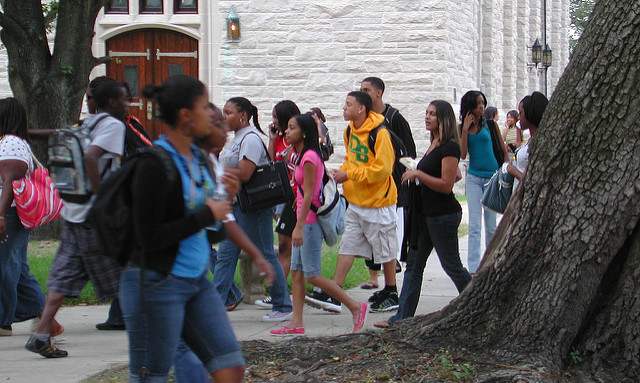Could the Flipped Learning Model be the Ticket to Increased Student Learning?

A guest post by Dr. Matthew Stoltzfus, Chemistry Lecturer at The Ohio State University
Instructors are constantly looking for ways to improve student performance—both traditionally and as part of so-called “twenty-first century skills,” such as communication, collaboration, and the ability to problem-solve. In a recent study, National Faculty Perspectives on Flipped Classrooms, 81 percent of faculty surveyed said that improved mastery of information — including these “twenty-first century skills” — were the top student benefit of implementing the flipped classroom.
A few weeks ago, I gave a chemistry presentation to a fifth grade class, and was stunned by how excited and interested the students were about science in general, compared to my college students. For some reason, sometime between elementary school and college, students seem to lose the curiosity factor. In my experience, flipping the classroom provides an avenue to ask the “why” questions again, rather than just deliver content to students and have them spit it back out in their notes. In essence, it has reenergized my passion for teaching.
Before I moved to the flipped classroom model, I hated PowerPoint presentations, so I stuck with a traditional “chalk talk” lecture. This worked for some learners, but in a class of 300+ students, I would inevitably lose the attention of all but the most attentive. Now, I’m able to record my lectures for students to read or listen to in advance of class, and open up class time for polling and answering questions and to have more in-depth discussions.
I have to credit MasteringChemistry for helping to make my flipped classroom successful. MasteringChemistry has tutorial questions with hints that make the students study the basics, so that they have a good idea of what I’m going to talk about in class. Then if they make a mistake, Learning Catalytics provides me with the analytics to show me where in the class the students are struggling, as each student logs their answers on a laptop, tablet, smartphone, or other mobile device.
Research has shown that instant feedback as well as peer-to-peer engagement helps improve student comprehension. Learning Catalytics allows faculty to obtain real-time responses to open-ended or critical thinking questions, determine which areas require further explanation, and then automatically group students for further discussion and problem solving.
I have been using Learning Catalytics for over a year now and with over 1,400 students. By automatically grouping students for discussion and problem-solving based on their responses to interactive questions, it helps make my class of 300-400 students feel much smaller. It truly changes the mindset of the class. Eric Mazur, the Harvard physics professor who is one of the developers of the advanced, cloud-based learning analytics and assessment system, infused the system with the research-based peer instruction pedagogy that he developed. I don’t see this in other programs that I use. It completely changes the dynamic of the classroom for the better.
Is the Flipped Learning Model Right for Me?
I think the biggest hurdle to adopting to the flipped teaching model is finding the time to put the most effective content together. Many instructors have been lecturing for years, and we have lecture and assignment materials that we are used to using. It’s easy to get stuck going through the motions, “not thinking” about what you are really teaching, but you need to adjust and have the self-discipline to be effective at teaching in a digital format. Teachers need to reinvest their time into teaching well.
The more you want the flipped classroom model — or really any learning model — to be successful, the more work you need to put into it. Before any educator makes the move from traditional teaching, they must ask themselves a few questions. Am I looking for less work? Do I want a shortcut to teaching? If that is the case, you may not want to make the switch, because the goal of the flipped classroom is to empower students to work harder and not cut corners to increase achievement.
For students entering a flipped classroom for the first time, they should understand that just as with life, cutting corners doesn’t result in improved outcomes. The same students that struggle because they do not do the work in the traditional model of teaching will also struggle in a flipped classroom model. Students that enter a flipped classroom for the first time should expect that just as they would in a traditional class, they will need to complete the assignments to do well in the class and not rely on Google for finding answers.
Getting Started with the Flipped Classroom
Flipping the classroom brings you back to being a first-year instructor; you must recreate lecture notes, and pick new pre- and post-lecture assignments. The easiest, but probably not the most effective, way to get started with dipping your toes into the flipped classroom is to just digitize your current lecture notes. That’s how I got started a few years ago, but now I am working on figuring out how to make my content more engaging and interactive for my students.
The best way to get started is to start small. Start with the concepts that you know best and that students are struggling with and try to teach it a little differently; then just flip those concepts. This will allow you the time to adjust, review the effectiveness, and see if you like the flipped classroom model before designing (or redesigning) the whole class this way. If you find that it works well, you can start building year to year. It’s really a long-term solution, not a fast fix. The most important thing is to make sure whatever teaching method you choose works well for your personality and your style of instruction.
At Ohio State, some instructors are slowly moving toward the flipped classroom model, but naturally have many questions and hesitancy before coming fully on board. This model of learning is gaining traction, though, so I think we’ll see more instructors jumping on the bandwagon as it gains credibility and widespread adoption.
This method of teaching is growing at a time when technology keeps evolving. As a passionate educator, I can’t wait to see how the way we teach will continue to change and improve to help make student learning more engaging and more successful.




